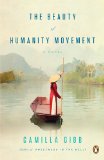Summary | Excerpt | Reading Guide | Reviews | Beyond the Book | Readalikes | Genres & Themes | Author Bio

A Novel
by Camilla Gibb
The foreman proves he is just like every mother's son. He leans over the bowl and inhales as he lays the noodles back down to rest in the broth, then clutches a few strands between his chopsticks and raises them to his mouth. The construction workers stand around the rim of the pool, watching their boss in silence. The foreman slurps broth from the spoon, lifts up a few more noodles with his chopsticks, curls them into his spoon, picks up a thin slice of beef, lays it on the bed of noodles, tweezes a piece of basil from the broth and places it on top of the beef, then puts this perfectly balanced combination, this yin and yang, into his mouth.
And then he grunts.
"I see what you mean," he finally says to Bình, handing the bowl back to Hung.
"Bring your bowl tomorrow. Tell your men too," Hung says quietly, squinting at the workers on the rim. His left eye is clouded over; his right discerns the outline of a row of men. "Half price for them," he says, "free, of course, for you."
"I'll pay you full price," says the foreman. "Just as long as you and your customers are out by seven."
"Yes, sir," says Hung, shuffling back to the fatter end of the kidney to extinguish his fire. He feels a tremor of nervous laughter rattle beneath his ribs. He dares not look over at Bình. He smiles into the fire, sharing the victory with its embers instead.
It is not yet half past six - still plenty of time left to serve the latecomers who have just arrived, which Hung does now with good humor and renewed concentration, laying noodles and beef into each bowl with his right hand, pouring ladlefuls of broth over the top with his left, his rhythm as even and essential as a beating heart.
Hung recognizes each man by the state of his hands: the grease moons under the nails that mark a mechanic, the calluses of one who works a lathe, the chewed nails of a student writing exams.
But then whose lovely hands are these amid this parade of manly paws? The delicate hands of a woman who has, improbably, never engaged in manual labor. And the bowl. Shining. Translucent. Porcelain.
He looks up. The young woman before him is a classic beauty with delicate, balanced features, and although she is not one of his regular customers, there is something familiar about her face.
Perhaps Bình sees it too, for he coughs in that moment and pulls his son away by the shirtsleeve - no time for gawking, time to get to work.
"You've come to me for breakfast before?" Hung asks, turning his attention back to the young woman before him.
"No," she says, revealing herself a foreigner with just one word. Her black suit and crisp white shirt also set her apart; she is dressed like a serious businesswoman, and those teeth - white as the snow that used to fall on Quyet Mountain when he was a boy, straight as the pines that crowned it.
"Maybe I knew you when you were a child?"
"I don't think it's possible, sir. I grew up in the U.S. But perhaps you knew my father - Lý Van Hai."
"Lý Van Hai," Hung repeats. The name is not entirely unfamiliar to him, but it is a sound far away, a temple gong ringing in a distant valley.
"He was an artist here in the fifties."
Hung stops the movement of his ladle. Wait. Who is this woman? And what does she want? Does the government now employ beautiful young women with foreign accents as spies? Has she been hired to trap him, all these years later, to have him admit some collusion with the men of the Beauty of Humanity Movement?
Hung straightens his back, ready to defend himself, when he suddenly sees all the color drain away from her face.
This girl is no spy.
"I'm sorry," she says quietly. "I know this must seem like it's coming out of nowhere, but I heard you knew many of the artists back then, and I've spent a year searching and nobody knows anything and I just . . ." she trails off, her shoulders slumping, her voice evaporating. "I just hoped that maybe you knew him."
Excerpted from The Beauty of Humanity Movement by Camilla Gibb. Copyright © 2011 by Camilla Gibb. Excerpted by permission of Penguin Press. All rights reserved. No part of this excerpt may be reproduced or reprinted without permission in writing from the publisher.
We should have a great fewer disputes in the world if words were taken for what they are
Click Here to find out who said this, as well as discovering other famous literary quotes!
Your guide toexceptional books
BookBrowse seeks out and recommends the best in contemporary fiction and nonfiction—books that not only engage and entertain but also deepen our understanding of ourselves and the world around us.